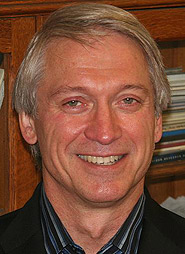Berkeleyan
Exploring the stigma of mental illness
In his new book, psychologist Stephen Hinshaw details the hurdles facing those sufferers, who are often viewed as 'outsiders' unworthy of help
![]()
| 26 January 2007
Andrea Stier, a graduate student in psychology, recently observed the stigma attached to mental illness when a student in her clinical psychology class made the frank disclosure that she suffers from bipolar disorder.
"Other students, who had previously been engaged and excited about learning about mental illness in the abstract, became extremely uncomfortable, refused to make eye contact with her, and were quiet and withdrawn," Stier says.
 |
That enduring fear of mental illness is precisely what Berkeley psychologists - under the tutelage of Stephen Hinshaw, chair of the Department of Psychology - are working to combat. Indeed, Hinshaw's new book, The Mark of Shame: Stigma of Mental Illness and an Agenda for Change (Oxford University Press) could well boost compassion for the mentally ill from the grassroots to the U.S. Capitol.
As Congress considers legislation that would require the same health coverage for mental illness as for physical ailments, lawmakers are becoming more receptive to evidence of the injustices suffered by those with disorders ranging from depression and attention-deficit/ hyperactivity disorder to schizophrenia and autism.
According to Hinshaw's book, those who suffer from mental illness continue to face housing and job discrimination as well as hurdles when voting, obtaining a driver's license, and maintaining child custody. "As a result, they lose out on major life opportunities," he says.
Indeed, notes Hinshaw, the public perception of serious mental illness is more negative today than it was a half- century ago, despite significant advances in education, medication, and psychological therapies.
In his book, Hinshaw uses scientific, cultural, and qualitative evidence to explain the historical roots of the stigma of mental illness, how it plays out on a daily basis, and what can be done to remedy this continuing problem. He warns that the stigma of mental illness will persist until a "civil rights movement" establishes equality for the mentally ill.
As part of its research into the stigma of mental illness, Hinshaw's team of graduate psychology students is looking into how the mentally ill are depicted in the news media, public versus hidden attitudes about mental illness, and the responses of grade schoolers and their parents to film clips about mental illness. Team members are also studying how interpersonal dynamics change when one member of a group is led to believe that another has been referred for mental-health care and may have a diagnosis of schizophrenia or depression.
Meanwhile, studies show that the stigma of mental illness prevents tens of millions of Americans from seeking treatment. A 2005 government-funded study, the National Comorbidity Survey Replication, found that fewer than half of those who reported mental illnesses during that year sought treatment, and those who did waited at least a decade, by which time they were more likely to have developed additional problems. Comorbidity is the simultaneous occurrence of two or more illnesses.
 Steven Hinshaw |
"Given the negative perceptions of mental illness, and the shame, it is not surprising that people with mental disorders delay seeking help for decades," Hinshaw says. "Concealment remains a major means of coping."
Largely to blame, Hinshaw says, are primal human fears of members of an "outgroup" threatening stability and survival, alarmist media portrayals of the mentally ill, and the failure of politicians and the health-care industry to give equal footing to mental-health-insurance coverage. While reports in newspapers and on television often depict the mentally ill as dangerous and unpredictable, the reality is that only a sub-group of people with mental illness are likely to be violent, Hinshaw argues. Indeed, people with mental illnesses are more likely victims than victimizers.
"Neglect and exclusion impede adequate research funding and clinical care, fueling the myth that mental illness is lifelong, hopeless, and deserving of revulsion," Hinshaw writes in his book.
A longstanding investigator of developmental psychopathology who previously has written about his father's lifelong struggle with misdiagnosed bipolar disease, Hinshaw is particularly committed to combating the sense of shame that prevents the mentally ill from seeking help.
"While there is a strong recognition that prejudice based on race, ethnicity, and gender is a social problem we need to understand and address, such recognition has not been given to prejudice - or its consequences - based on mental illness," says psychology professor Rodolfo Mendoza-Denton, whose research also deals with stigma, but as it pertains to race and ethnicity. "This is why Professor Hinshaw's book is so important."
The Mark of Shame demonstrates how mental illness has historically been met with ignorance, superstition, and even torture, from the early practice of boring holes in people's heads to release the evil spirits dwelling there to inhumane post-Renaissance asylums, eugenics, and Hitler's genocide programs.
Moreover, the deinstitutionalization strategies of the latter part of the 20th century, Hinshaw says, emptied most mental hospitals. As a result, huge numbers of the mentally ill today live on the streets or are warehoused in jails and prisons. Meanwhile, conditions in psychiatric wards at the few remaining public hospitals are plagued by understaffing, assaults, suicides, drug trafficking, and the excessive disbursement of psychotropic medicines, he says.
"A far brighter future can and will emerge when knowledge replaces ignorance, when effective treatments supplant custodial care and inadequate community intervention, when legislation mandates equality, and when contact with the realities, rather than the stereotypes of mental disorder, taps people's empathy," he writes.
Hinshaw will read from The Mark of Shame at 7 p.m. Monday, Jan. 29, at Cody's Books, 1730 Fourth St., Berkeley.

